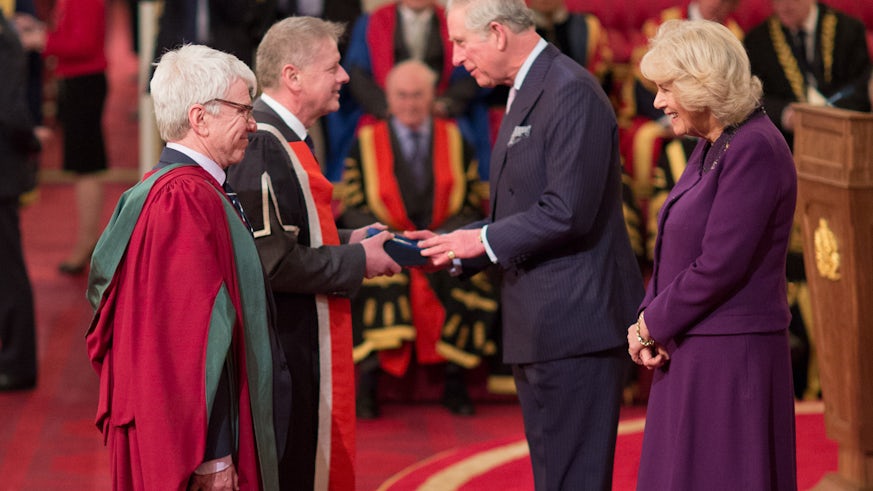Queen’s Anniversary Prize awarded
26 February 2016

University’s leading mental health research facility picks up UK’s most prestigious academic award at a ceremony in Buckingham Palace
Cardiff
University’s world-leading mental health research facility has been awarded the
UK’s most prestigious academic award - the Queen’s Anniversary Prize.
On behalf of the University’s MRC Centre for Neuropsychiatric Genetics
and Genomics, Professor
Sir Michael Owen picked up the award at a ceremony in Buckingham Palace held on
Thursday.The prize is awarded every two
years by the Queen in recognition of an academic or vocational institution, and
falls within the UK’s national honours system.
Speaking of the award, Professor Owen said: “I am extremely proud of all the staff in the Centre for winning this award.
“It is a
reflection of the amazing achievements made possible by an excellent team of
scientific, technical and administrative staff which sits at the forefront of
mental health research.
“Their efforts have succeeded in casting light into some of the darkest corners
of mental illness and place us in strong position to make further advances that
will lead to substantial benefit to patients.
“Over the next five to ten years, the focus of the Centre will be to put our
genetic discoveries to work to better understand disease mechanisms, develop
improved diagnostic approaches and treatments; and become a leading centre of
translational neuroscience.
“Centre scientists are also increasingly applying genetic findings in
epidemiological settings in order to study the impact of genes at a population
level, improve prediction and diagnosis, and understand how environmental and
social factors interact with genetic predisposition to cause mental illness.
“I am very grateful to the MRC for their sustained support for our research
over many years, and to Health and Care Research Wales as well as many other
funders. I am also immensely grateful to Cardiff University for backing us so
strongly and for nominating us for this award.”
Under the
leadership of Professor Owen the Centre brings together a global community of
leading researchers to investigate the causes of a number of major psychiatric
and neurodegenerative disorders.
Their work seeks to improve understanding of how these diseases arise; to
develop new diagnostic approaches and identify new targets for treatment.
Its research has, since launching in 2009, made giant strides in discovering
the genetic underpinnings of a range of diseases from Alzheimer’s and
schizophrenia to bipolar disorder and ADHD.
Among the Centre’s landmark discoveries are the identification of a genetic
link between intellectual disability, autism, ADHD and schizophrenia; the
discovery of the first specific genetic risk factors for schizophrenia, bipolar
disorder and ADHD; and the discovery of the first new Alzheimer’s disease risk
genes for over 17 years.
This work has implicated a number of novel disease mechanisms and Centre
scientists are now using a variety of cutting-edge techniques to translate
these recent findings into new approaches to treatment and prevention.
As well as their fundamental genetic discoveries, the work of Centre
researchers has directly influenced policy and practice.
For example, their research has provided strong evidence that cannabis is one
of the few modifiable risk factors in the prevention of schizophrenia; has led
to a novel interactive programme to help sufferers of bipolar disorder manage
their condition; and has effected a step change in the way homeless young
people in Wales are assessed for mental health disorders.
Vice-Chancellor Professor Colin Riordan said: “In the six years it’s been
operational, the Centre has gleaned insights to some of the most intractable
mental health illnesses.
“The internationally-renowned team has translated ground-breaking findings into real patient benefit, helping to cement the University’s world-leading position in mental health research. This prize is a well-deserved reflection of that success.”
The award
has been welcomed by the wider academic and political community.
First Minister of Wales Carwyn Jones said: “I’d like to offer my congratulations
to Cardiff University for being awarded the highly prestigious Queen’s
Anniversary Prize.
“It truly
is a fantastic achievement and clear recognition of the exceptional work that’s
being undertaken at the University in finding pioneering and innovative ways of
treating mental illness.”
Professor Sir John Savill, Chief Executive of the Medical Research Council,
said: “Research into mental health has made some amazing advances over the last
five years. Genes for common mental illnesses have been discovered and we’re
rapidly discovering more - the MRC Centre for Neuropsychiatric Genetics
and Genomics has played a world-leading role in this enormous leap-forward in
our biological understanding of mental health disorders.
“For example, the genetic overlap that has been demonstrated between autism,
schizophrenia and bipolar is changing our understanding of these disorders. The
next step will be to look at the functional implications of these genes and the
biological pathways as this research will inform us of the best opportunities
to treat these pervasive mental health disorders.”
Eric Lander, President and founding director of the Broad Institute of MIT and
Harvard in Cambridge, Massachusetts, said:"The Cardiff University team has
played a critical role in uniting the global research community toward the goal
of transforming the understanding and eventual treatment of psychiatric
disease. It's wonderful to see their accomplishments recognized with this
award."
The Centre offers a unique research environment in Wales to increase
participation in mental health research and translates discoveries into direct
patient benefit.
In the six
years it’s been active, it has created 182 jobs and attracted over £90M of
investment, succeeding in establishing the University and Wales as global
leaders in neuroscience and mental health.
Beyond research, the Centre delivers innovative programmes in undergraduate and
postgraduate education and is committed to dispelling the stigma around mental
health disorders through a wide-ranging public engagement agenda.
Since 2000, the University has won six Queen’s Anniversary Prizes for research ranging from geo-environmental engineering and
violence prevention to medical genetics and clinical diagnosis.
The Queen’s Anniversary Prize was established in 1993 with the approval of the
Queen and received all-party support in Parliament.